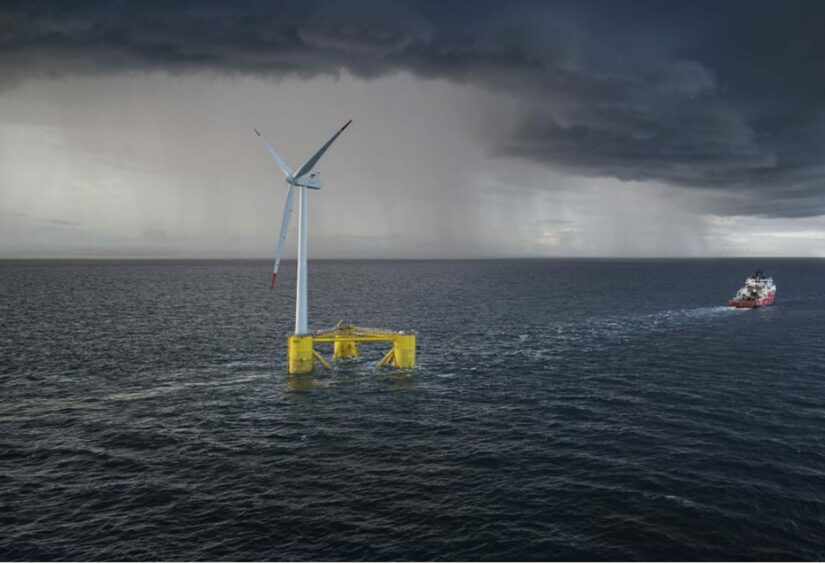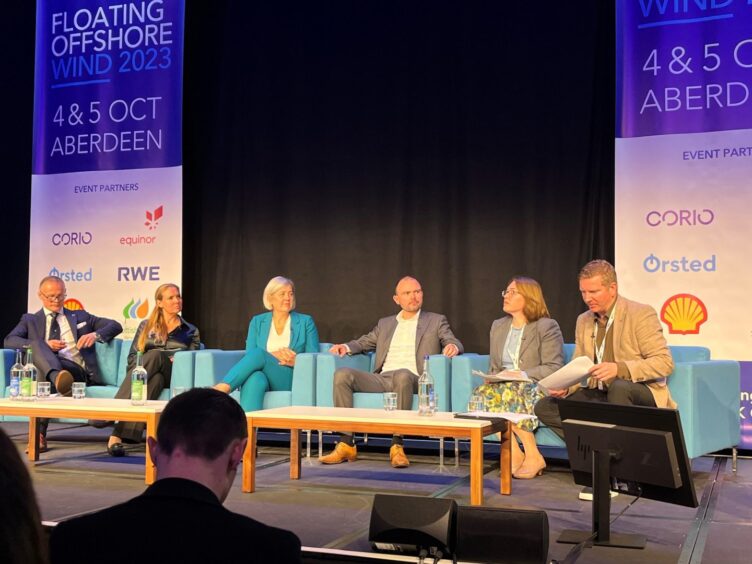
The Floating Offshore Wind conference in Aberdeen has heard that industrialisation is needed for the green energy source to achieve success.
Across the conference’s opening two sessions, the theme of industrialisation was consistent. Being able to roll out infrastructure at scale and standardising technology were sentiments shared by the likes of Shell, Equinor, Ørsted and more.
Steinar Berge, Equinor’s head of floating offshore wind, shared in the first session of the day that the UK needs “to foster more collaboration and standardisation across all developers and supply chain.”
Ørsted’s head of floating wind, Gabriel Davies, added in the second session: “Innovation is a wonderful thing but now there are numerous designs for foundations, for dynamic cables, mooring systems, and when we can converge to fewer and more standardised technologies, that’s when you’re really going to see that accelerated learning curve.”
Ms Davies continued: “Simplicity, scalability and reliability are the backbones of industrialization. So, if we can focus on those things … that is what is going to make floating very successful.”
Global Energy Group’s executive director, Iain Sinclair, concurred with the points around standardisation made by Mr Berge and Ms Davies in the earlier ‘Industrialising floating offshore wind’ panel session.
He expressed that “each port has a role to play” on a global scale, however, there needs to be an understanding that every time changes are made “a cascade goes all the way down to what the substructure does and that knock-on effect from a port perspective result in us having a lack of certainty.”
Standardisation proved to be something of a hot topic on the first day of RenewbaleUK’s Floating Offshore Wind Conference at Aberdeen’s P&J Live, however, the messages shared by panellists are not new ideas.
Earlier this year, the director of the Robert Gordon University (RGU) Energy Transition Institute, Paul de Leeuw, told Energy Voice that a “standardised design” for turbines would enable the UK to build green energy infrastructure cheaply.
‘We need the right policies’
Industrialisation and standardisation were not the only talking points at the Granite City conference, industry was also calling for government support for floating offshore wind.
Ms Davies told delegates that one challenge being faced by the floating wind is “acknowledging the challenges and mobilising political commitment to overcome them.”
She explained: “We need to instil market confidence and attract capital.
“I think what I’m saying here is government that’s really crucial right now to keep the confidence in the offshore industry.”
Ms Davies added: “Consenting is going to be a topic that comes up again and again, but ensuring predictable, transparent and fast permitting processes and that can be done without compromising on environmental or social sustainability.”
Ms Davies’ fellow panellist Gillian Noble, managing director of offshore, development and operations for ScottishPower Renewables, agreed with the points made about government support.
Ms Noble told attendees of the ‘Accelerating progress: Time to step up or step aside?’ session: “I suppose when it comes to stepping up, it’s easy to say government can do things, but ultimately, we need the right policies.”
She explained that the government must set long-term goals for the energy source.
Ms Noble said: “We need the long-term commitment if the UK is going to maintain or get itself back on track after this year.”
The ScottishPower Renewables boss was referring to the government’s failure to agree any contracts for difference (CfD) deals for offshore wind earlier this year.
The Department for Energy Security and Net Zero reported that there were 95 CfDs for clean energy projects last month.
ScottishPower chief executive Keith Anderson described the failure of offshore wind at the time of the announcement as a “multi-billion-pound lost opportunity to deliver low-cost energy for consumers and a wake-up call for government”.
Recommended for you


 © Supplied by Andrew Dykes
© Supplied by Andrew Dykes